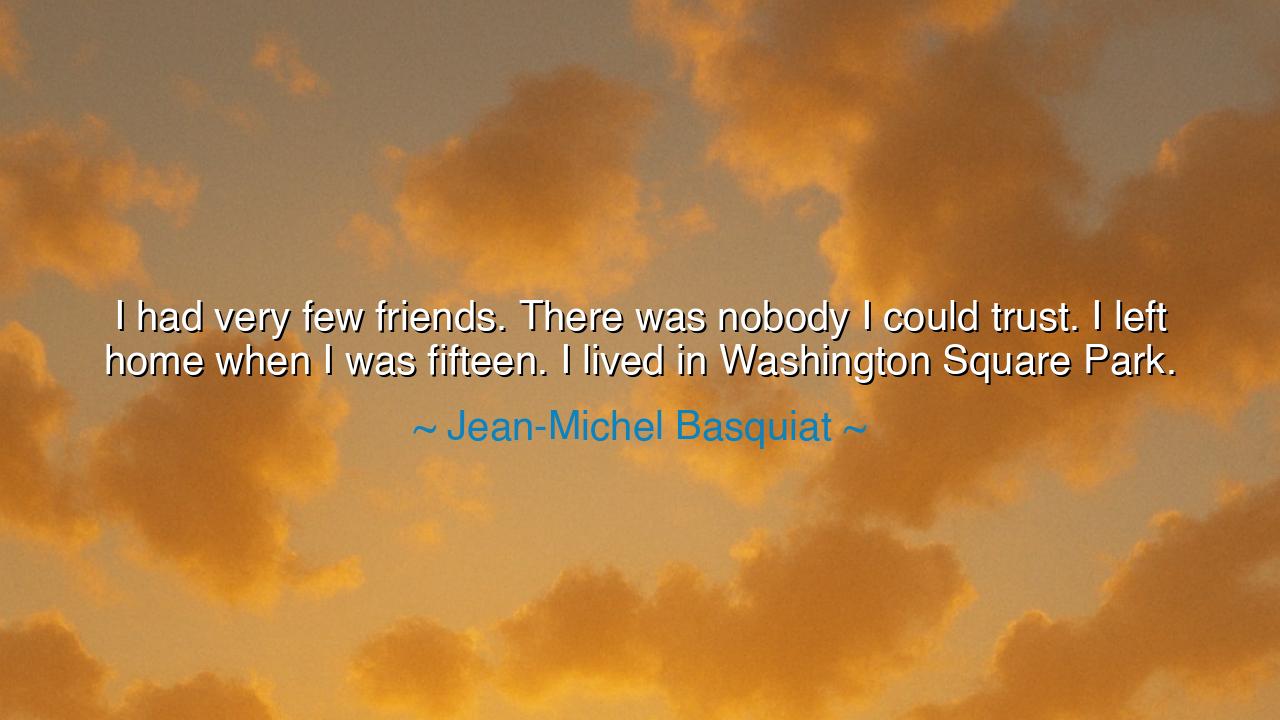
I had very few friends. There was nobody I could trust. I left
I had very few friends. There was nobody I could trust. I left home when I was fifteen. I lived in Washington Square Park.






The artist Jean-Michel Basquiat once said, “I had very few friends. There was nobody I could trust. I left home when I was fifteen. I lived in Washington Square Park.”
In these bare and haunting words, one hears not complaint, but confession — the voice of a soul forged in solitude, a young man cast adrift in a world that did not yet understand the fire he carried within. His statement is both a lament and a revelation: that loneliness, though cruel, can become the crucible of genius, and that trust, once broken, often drives the spirit inward, where art, thought, and creation are born. To live alone at fifteen, to dwell among the restless and the forgotten of Washington Square Park, was to be both exiled and awakened — to see life in its rawest truth, stripped of comfort and illusion.
The origin of this quote lies in Basquiat’s early life in New York City, long before the world would know his name or his brilliance. Born in Brooklyn to a Haitian father and a Puerto Rican mother, he grew up between worlds — cultured yet chaotic, intelligent yet unmoored. His home was marked by both beauty and pain, and when those bonds fractured, he fled into the streets. At fifteen, he was homeless, living among the outcasts, sleeping beneath park benches and painting on whatever surfaces he could find. Yet it was there, in the margins of society, that his vision began to take form. What he lacked in security, he found in freedom; what he lost in companionship, he gained in clarity.
Basquiat’s words, though rooted in his own hardship, echo a truth the ancients themselves would recognize: that solitude is the anvil of greatness. Many who changed the world walked first through the wilderness of isolation. Siddhartha left the palace of his youth to sit beneath the Bodhi tree in search of truth. Vincent van Gogh, misunderstood and scorned, found his light among the fields of loneliness. Even Jesus of Nazareth, before his ministry, spent forty days in the desert, tested and alone. Such solitude, painful as it is, strips the soul bare and forces one to listen — not to the noise of others, but to the quiet voice of destiny. Basquiat, though only a boy, was already walking this timeless path: alone, yet guided by the unseen hand of purpose.
And yet, there is tragedy in his words — the sorrow of a heart that could not trust. To live without trust is to live as a wanderer in spirit, cut off from the warmth of human fellowship. Trust is the root of love, and when it is severed, the tree of belonging withers. But from that emptiness, Basquiat created art that spoke for the voiceless. His paintings — wild, urgent, defiant — became his language of survival, his dialogue with a world that had refused to listen. In every stroke, one can feel the ache of exile and the triumph of expression. The boy who had no home built one upon canvas; the man who had no friends spoke through color and symbol to generations yet unborn.
His story mirrors the fate of many who are born before their time — those whose minds burn too brightly for the comfort of the ordinary. Like Prometheus, who stole fire from the gods and suffered for it, Basquiat brought to the world a light drawn from the depths of struggle. But such light comes at a cost. The same solitude that sharpens vision can also wound the heart. Fame came to him swiftly, but peace never did. The child who once slept in the park became a star of the art world, yet he remained haunted by the shadows of mistrust and pain. His early isolation, though it gave him power, left scars that no success could heal.
Still, his life stands as a testament — that out of loneliness can rise creation, and out of loss can come legacy. Basquiat’s journey reminds us that pain does not always destroy; it sometimes transforms. Those who have been cast aside, who have walked alone, carry a kind of sight that others cannot fathom. They see the truth of the world not from its glittering halls, but from its broken streets. In that truth lies the seed of art, of empathy, of innovation. His story teaches that the outsider’s gaze — though born in suffering — is the gaze that changes civilization itself.
So, my child of the wandering heart, take this lesson from Basquiat’s life and words: do not fear loneliness, but learn from it. If you ever find yourself without friends, without trust, or without a home, remember that the fire within you may yet build a new one. Use your solitude not to despair, but to create — to think, to dream, to reach for something higher than the world around you. Seek truth as he did, not through comfort, but through courage. And when the time comes to rejoin the world, bring with you the art — the wisdom — that only those who have walked alone can offer.
For in the end, Basquiat’s story is not of loss, but of becoming. The boy who lived in the park gave his loneliness to the world as beauty. His pain became paint; his silence became song. And thus, his life speaks forever this ancient truth: that even from exile, one can build eternity — that even the broken soul, if it dares to create, becomes immortal.






AAdministratorAdministrator
Welcome, honored guests. Please leave a comment, we will respond soon